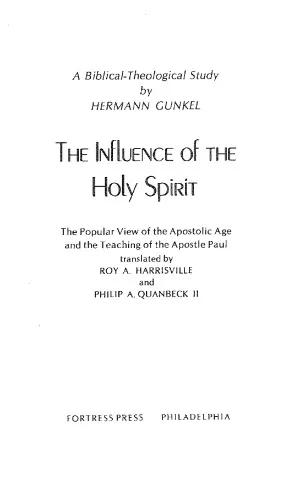The Influence of the Holy Spirit: The Popular View of the Apostolic Age and the Teaching of the Apostle Paul: A Biblical-Theological Study
4.5
Reviews from our users

You Can Ask your questions from this book's AI after Login
Each download or ask from book AI costs 2 points. To earn more free points, please visit the Points Guide Page and complete some valuable actions.Introduction to "The Influence of the Holy Spirit"
"The Influence of the Holy Spirit: The Popular View of the Apostolic Age and the Teaching of the Apostle Paul: A Biblical-Theological Study" is a profound exploration of the theology surrounding the role of the Holy Spirit in the early Christian Church. As one of the pioneering works of biblical theology, this book examines how the Spirit of God was understood both in the popular imagination of the Apostolic Age and within the sophisticated theological framework of the Apostle Paul. My goal in writing this text was to bridge the gap between historical religious thought and contemporary theological inquiry, offering a detailed exegesis on the subject of pneumatology. This foundational study provides clarity and depth on the spiritual dynamics that shaped early Christianity, ultimately influencing Christian thought and practice for centuries to come.
Written with meticulous scholarship, the book delves into two critical perspectives: the popular oral culture of the Apostolic Age, which often emphasized the Holy Spirit in a charismatic and experiential manner, and Paul's more systemic and theological treatment of the Spirit's role in Christian life and salvation. Through careful examination of Paul's epistles and contemporaneous accounts, this book seeks to illuminate how one of Christianity's essential doctrines developed through history and theological reflection.
Detailed Summary of the Book
This book is divided into two primary sections: the cultural-historical perspective of the early Apostolic Age and Paul's theological articulation of the Holy Spirit’s role.
The first section addresses how the Holy Spirit was understood in the collective imagination of early converts and communities. It reflects on themes like the Spirit's tangible manifestations in ecstatic prophecy, miracles, and glossolalia (speaking in tongues). These phenomena were integral to the earliest believers' understanding of God's direct engagement with His people. The Holy Spirit, in this context, was a visible, almost tangible agent of divine activity—a mark of God's immediate presence among His followers.
The second section focuses on Paul's writings, where the concept of the Holy Spirit is intellectually systematized into Christian theology. Paul emphasizes the Spirit's role in justification, sanctification, and unifying the body of Christ. He develops a doctrine that transcends the popular experiential view, presenting the Spirit as the guarantor of salvation, the transformative power that shapes believers into the image of Christ, and the agent behind the Church's collective identity. Through an exegetical analysis of texts such as Romans 8, Galatians 5, and 1 Corinthians 12-14, I unpack Paul's rich theological vision of the Spirit operating in both individual lives and the collective Church.
Key Takeaways
- The Holy Spirit, in the Apostolic Age, was perceived both as a source of individual empowerment and communal unity.
- Pauline theology advanced a systemic understanding of the Spirit as the foundation of Christian identity and salvation.
- The book explores the shift from a charismatic and experiential view of the Spirit to a doctrinal and theological comprehension within Christianity.
- Through Paul's epistles, the Spirit is revealed to be central to God's plan for redemption and transformation in human lives.
- A balance between spiritual experience and theological understanding is pivotal for grasping the role of the Holy Spirit in the Christian tradition.
Famous Quotes from the Book
"The Spirit of God in the Apostolic Age was not merely a theological abstraction but a source of living power—a force that altered lives, propelled the Church into existence, and bore witness to the presence of God among His people."
"Paul’s concept of the Holy Spirit reveals a profound truth: that God is not distant but intimately involved in the transformation of the believer and the life of the Church."
"In the Apostolic view, the Spirit was a visible fire; in Paul’s theology, it became a refining flame."
Why This Book Matters
This work holds enduring significance for theologians, pastors, and lay readers alike. It bridges the chasm between historical cultural phenomena and systematic theology, providing a richer understanding of how one of Christianity’s core doctrines developed. Furthermore, it unearths valuable insights about how contemporary Christians might experience and articulate the work of the Holy Spirit in their lives today.
The book also addresses a perennial challenge: reconciling personal spiritual experience with structured theological frameworks. By examining Paul’s theology in dialogue with the vibrant spirituality of the Apostolic Age, it inspires readers to reflect on the role of the Spirit in modern Christian life—personally and corporately.
Moreover, as Christianity continues to grow globally in regions where charismatic and experiential spirituality is prominent, this book offers a nuanced perspective that connects the richness of experiential faith with the depth of theological wisdom. Its relevance spans across denominational and cultural boundaries, highlighting the universality of the Spirit’s work in Christian belief and practice.
This introduction serves as a gateway into the profound themes explored in the book, demonstrating how essential the knowledge of the Holy Spirit is for understanding Christian theology and history.
Free Direct Download
Get Free Access to Download this and other Thousands of Books (Join Now)
For read this book you need PDF Reader Software like Foxit Reader
Accessing books through legal platforms and public libraries not only supports the rights of authors and publishers but also contributes to the sustainability of reading culture. Before downloading, please take a moment to consider these options.
Find this book on other platforms:
WorldCat helps you find books in libraries worldwide.
See ratings, reviews, and discussions on Goodreads.
Find and buy rare or used books on AbeBooks.


